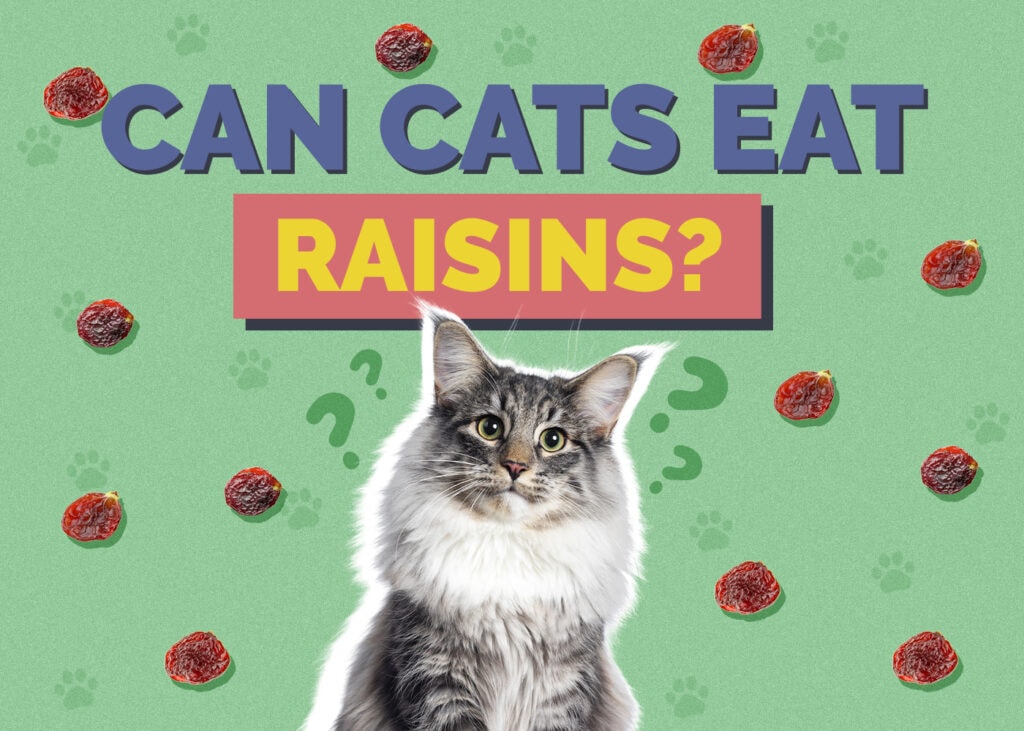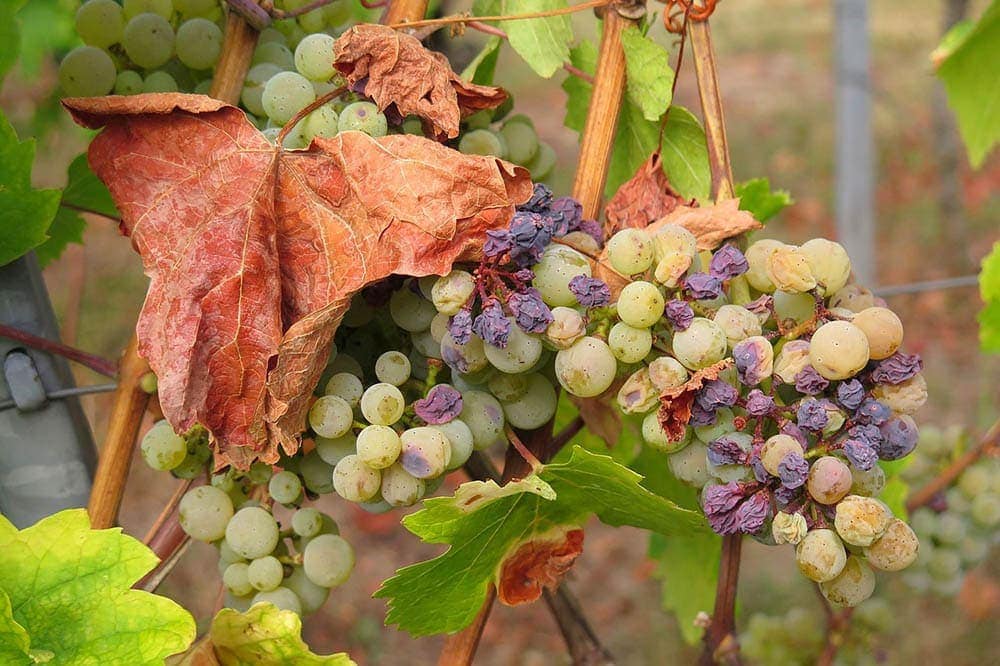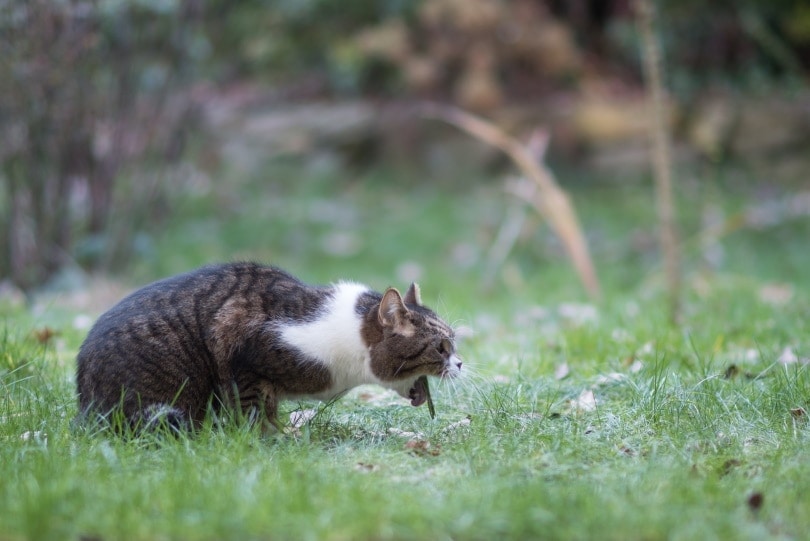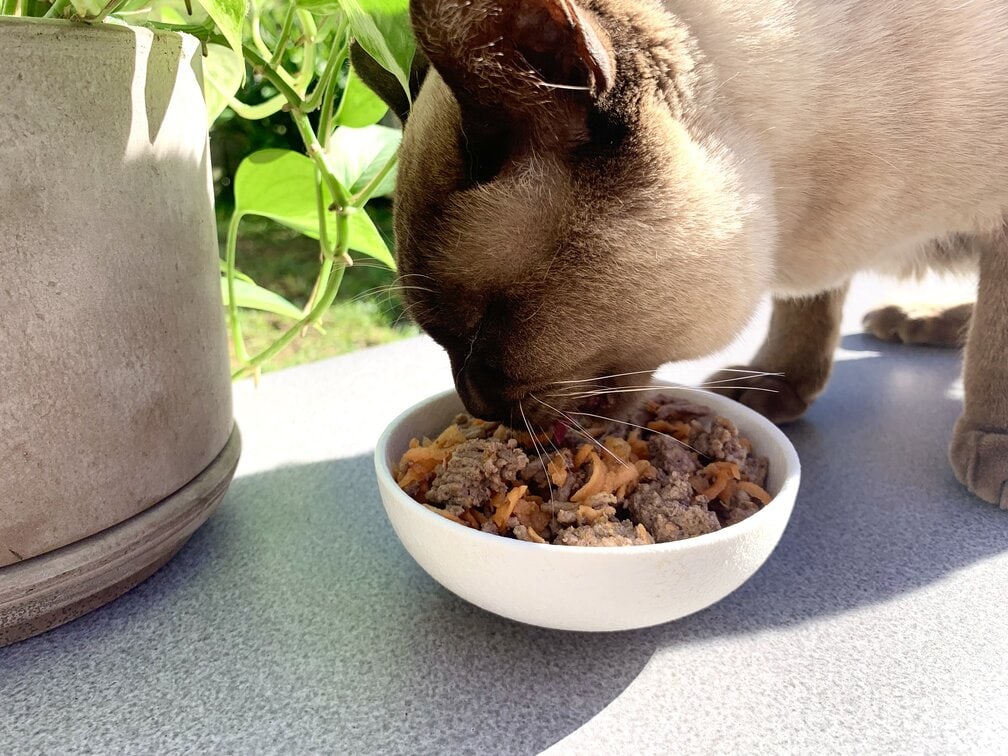Can Cats Eat Raisins? Vet-Approved Facts & FAQ

Updated on

One of the healthiest snacks found in many households, especially households with children, is boxed raisins. While these are the perfect snack to give your kids, what happens if your cat gets into that raisin box instead. Can cats eat raisins? The answer to that question is a loud, resounding absolutely not!
While this dried fruit may offer you and your children some health benefits, they offer no health benefits to your cat. In fact, raisins, as well as grapes, are highly toxic to your feline friend and should be avoided at all costs. In fact, even just one or two grapes or raisins warrant a trip to your vet right away. So if this is the case in your cat, please do not waste valuable time reading our article and call your vet immediately. You can come back here after your cat has had prompt treatment, and this should be done in the first 2 to 6 hours after ingesting raisins while they are still in your cat’s stomach.
In this article, we’ll discuss why you shouldn’t feed your cat raisins, how to spot raisin poisoning in your cat, and even some healthy substitutes for raisins to feed them as well.
Why Are Raisins Toxic to Cats?
Whether it’s grapes or raisins, both fruits are extremely toxic to felines. Eating as little as one or two raisins or grapes can cause total renal failure or kidney problems, as the toxic dose remains unknown. However, raisins are even more harmful to your cat than grapes are. This is because the raisins are in a concentrated form, and the cat can gobble much more down much quicker. Only recently scientists have identified tartaric acid as the most likely culprit for toxicity of raisins and grapes.1
Both raisins and grapes, irrespective of the amount or your cat’s size, may affect your cat’s kidneys severely and irreversibly, so make sure to get your feline companion to the vet as soon as possible if your cat has ingested any or if you notice signs of raisin poisoning, described in our next section.
However, keep in mind, these signs of toxicity can be present with many other toxins or may initially resemble a stomach upset, so if you have seen your cat eat a raisin or a grape, arrange a vet visit immediately before any signs actually appear, as by then, kidney damage may have already happened.
Your cat has the best chances of complete recovery without any long-term consequences if treated immediately after ingestion, and no longer than 4 to 6 hours after.

What Are the Signs of Raisin Toxicity in Cats?
Raisins have a very high level of toxicity for cats, so you need to contact your vet immediately and get your cat treated in time. Delaying the call and treatment means the raisins will leave the stomach and enter the intestine, and the treatment will have limited to no effect, leaving your cat at risk of severe and sometimes fatal kidney damage.
After just a few hours, as little as 4 to 6 from when your cat ate them, your vet may not be able to successfully decontaminate the cat’s stomach using the usual medication and may only treat the consequences of toxicity.
- Vomiting
- Abdominal pain
- Diarrhea
- Dehydration
- Excessive urination and thirst at first
- Very little or no urination as the signs progress
- Loss of appetite
- A general weakness
- Very little movement
- Lethargy
If you notice any of these signs in your cat, it’s crucial to get them to your local emergency vet right away before it’s too late.
These signs may indicate renal failure and can be fatal if your cat does not receive treatment immediately. Don’t be fooled thinking it’s been 24 hours just because your cat seems fine. It can take 48 hours or more for signs of kidney damage to occur.
What Should You Do if You Suspect Your Cat Has Raisin Poisoning?
If you suspect your feline friend has gotten into raisins and been poisoned, then the first thing you need to do is contact your vet immediately. If you act quickly enough and get your cat to the vet, it’s possible the damage can be stopped, and your cat can be saved.
To help your cat vomit up what they ate and to reduce the number of toxins in their system, your vet will use a specific medication to safely induce vomiting if it hasn’t been more than 4 to 6 hours since ingestion. This is the most effective way to prevent toxic effects of raisins on the cat’s kidneys. Everything else will be less effective. Your vet may use activated charcoal afterward to help bind any remaining toxin from the cat’s gastrointestinal tract.
If it has been longer than 4 to 6 hours since ingestion and your cat does not vomit up the raisins with the administered treatment, they will be put on IV fluids and undergo supportive care. Your cat may need to stay in the vet’s hospital for a few days so they can get all the toxins out of their system and ensure their kidneys are functioning properly. In this case, there may be a higher risk of kidney damage as the raisins remain in the cat’s body. And again, your vet may also prescribe activated charcoal.
Never, ever try to induce vomiting on your own at home, as that’s dangerous and often ineffective to your cat as well. Also, since the procedure to induce vomiting is tricky, you could end up doing your cat more harm than good by trying to help them inappropriately, and wasting valuable time. So instead, leave it to the professionals.
Of course, the best way to avoid your cat ending up with raisin poisoning is to prevent them from eating the raisins to begin with. So, in our next section, we’ll give you some tips on keeping the raisins away from your furry friend.

How to Prevent Your Cat From Eating Raisins
Every pet owner knows that cats can get into places you didn’t even think possible. Unfortunately, this means sometimes it’s hard to keep food away from your sneaky, curious cat. However, it’s extremely important to keep the raisins away from your feline for the reasons listed above.
The good news is that your cat probably won’t want to eat them, to begin with, because cats are carnivores and would much rather have the chicken on the counter than the raisins in a bowl on the table. However, they have been known to dig into veggies and fruits from time to time, so here’s a couple of tips for you.
Store the Raisins Out of Your Cat’s Reach
Easier said than done, we know. However, you should be fine if you store the raisins in an airtight container in a pantry that the door stays shut on. Just don’t forget to close the door when you’re not in the pantry or cabinet.
Feed Your Cat an Alternative Snack
Of course, while you’re eating, your cat may want to eat with you. So, providing them with a different snack while you’re eating your raisins should work. We’ll give you a few alternatives to raisins below.

Alternative Snacks for Your Hungry Feline
If you’re looking to give your can alternative healthy snacks, we’ve got a few you can try to offer below. However, remember that treats should be given in moderation and should make up no more than 10% of their daily food intake.
While these are a good choice as a healthy snack for your cat, they should never be used as a main meal or given constantly. Cats are carnivores and need a lot of protein to stay healthy, so provide snacks with care.
Now that you know what you can safely feed your cat, it’s just as important to find a bowl that supports their health and well-being. With whisker-friendly bowls and a wide tray to catch any spills, our Hepper NomNom Cat Bowl is our favorite option.
 Final Thoughts
Final Thoughts
So, no, it is not okay to give your cat raisins in answer to the question above. Raisins are highly toxic to our feline friends and need to be avoided at all costs. If you suspect that your cat may have gotten into the raisins in your kitchen, then make an appointment with your vet straight away to make sure they get the prompt treatment they need and get on the road to a full recovery. If you know your cat has ingested raisins, don’t wait for the signs to begin; take them to the vet right away, as the treatment in this early stage may prevent severe kidney damage and give your cat the best chance.
Featured Image Credit: Needpix



 Final Thoughts
Final Thoughts








